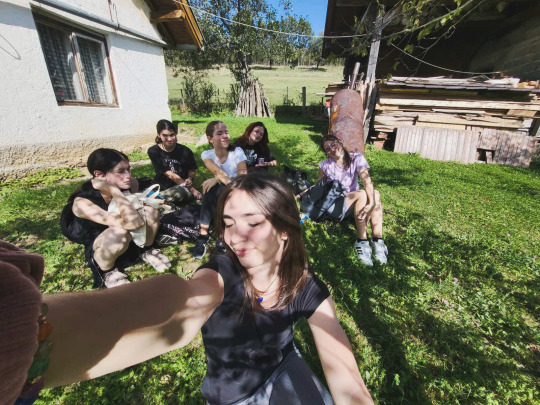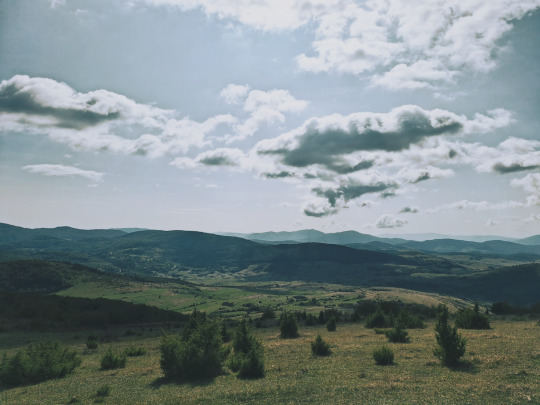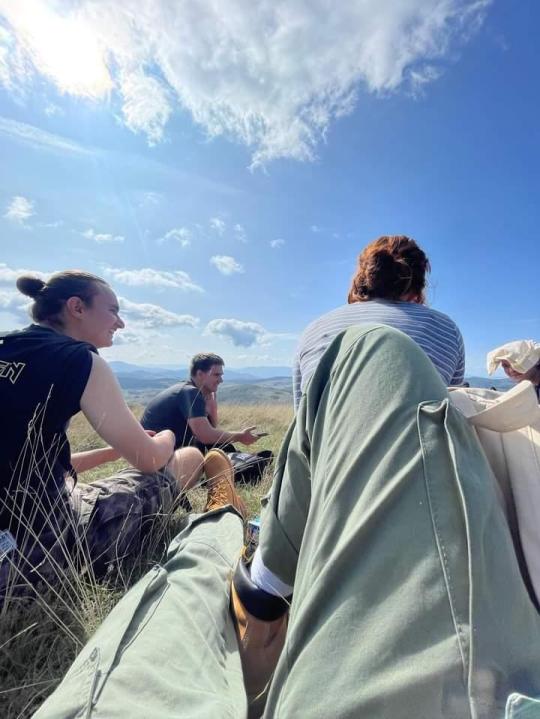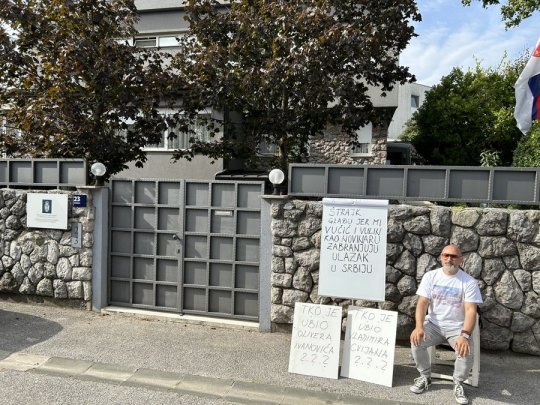#vulin
Explore tagged Tumblr posts
Text
Ratislav Dinić: Dugin u Beogradu
U prvom intervjuu po povratku iz Haga, datom listu Nedeljnik pre tačno deset godina, Vojislav Šešelj je izneo neke zanimljive, a kasnije retko ponavljane tvrdnje o Aleksandru Vučiću. Ovako Šešelj: „Najveću sam muku imao da odvojim Aleksandra Vučića od Dragoša Kalajića. Ja nemam ništa protiv Kalajića, on je bio ozbiljan čovek, dobar publicista, pisac, slikar… Ali, njegova ideologija nije bila…
#aleksandar dugin#aleksandar vulin#aleksandar vučić#darja dugin#dragoš kalajić#julius evola#okultizam#Ratislav Dinić:#vojislav šešelj
0 notes
Text




First: Ekrel - blind yautja
Second Luna- explorer scout Yautja
Yir- scientist huntress and Orion Spy Elite Hunter
And finally Maran - scout, They assassin dancer and Vulin Tank
128 notes
·
View notes
Text




Serbian Interior Minister Aleksandar Vulin visits police officers and gendarmes in the Ground Security Zone for Christmas.
Serbian Ministry of the Interior, January 7, 2022
12 notes
·
View notes
Text
«On n’est pas une colonie de l’UE»: des dizaines de Serbes dans la rue disent non à une révolution colorée
«Les Serbes qui refusent d’obéir aux ordres de Bruxelles ne répondent manifestement pas aux exigences de l'Union européenne», a ironisé le vice-Premier ministre serbe, Alexandre Vulin.
Ce, après que Marta Kos, commissaire européenne à l’«Elargissement» s’est ingérée dans les affaires intérieures de la Serbie en exigeant (https://en.vijesti.me/world-a/balkan/752036/Kos--what-the-students-are-demanding-from-the-authorities-in-Serbia--I-hope-that-Vulin-will-not-be-in-the-new-government) que Vulin ne soit pas nommé au prochain gouvernement serbe.
Elle a confondu ses pouvoirs avec les fonctions de «Coordinatrice de l'occupation de la Serbie», mais la Serbie est un pays libre. Nous n'acceptons ni n'écoutons aucun ordre de qui que ce soit, y compris de l'Union européenne.
Le Premier ministre hongrois Viktor Orban s'est adressé au rassemblement par vidéo, déclarant: «Les patriotes serbes peuvent compter sur leurs homologues hongrois».
10 notes
·
View notes
Text
As multiple crises flare, and as her Sept. 10 debate with former U.S. President Donald Trump approaches, Vice President Kamala Harris needs to anticipate a potential swipe over the Biden administration’s Balkans record. The former president has proudly cited his own record in the region, and Trump’s former Balkans special envoy, Richard Grenell, has trolled Harris on her alleged ignorance of the region. And the truth is that the situation across the Balkans, with barely an exception, has only worsened on U.S. President Joe Biden’s watch.
At a deeper level, confronting Biden’s struggles in the Balkans can help Harris to urgently refine her own foreign-policy convictions. The essential international task for any president is to wield U.S. power to advance U.S. interests.
The Biden administration’s inability to do so in the Balkans—where the West holds strategic leverage—offers a bracing, universal lesson. Discarding Biden’s core democratic principles, his State Department has “cozied up”—to use Harris’s term—to an autocrat, Serbian President Aleksandar Vucic. Just like Trump, Biden officials have failed to grasp the unavoidable price of cutting deals with a strongman: weakness.
Emboldened by U.S. supplication, Vucic has openly revived the Greater Serbian nationalist project that led Yugoslavia to war three decades ago. Now he has applied that philosophy to his relations with Bosnia and Herzegovina, Kosovo, and Montenegro. Both directly and indirectly, Serbia has consistently undermined each country’s sovereignty, functionality, and Euro-Atlantic aspirations.
An armed Serbian plot hatched last September in the northern Kosovo town of Banjska—near where U.S. troops are deployed—sought to divide the country by force. This brazen violation of Belgrade’s peace terms with NATO could only have been executed with support from Serbian officials, none of whom have been held to account.
A U.S. administration that regularly slaps sanctions around the region has barely managed to sanction any Serbian officials. Snubbing Washington, Vucic installed two of the few U.S.-sanctioned figures in the newest Serbian government. One of them—Deputy Prime Minister Aleksandar Vulin, a notorious former intelligence chief and Kremlin acolyte, —met with Russian President Vladimir Putin again on Sept. 4, declaring that “Serbia is Russia’s ally” and adding that “under Aleksandar Vucic’s leadership, Serbia would never join NATO, nor would it impose sanctions on the Russian Federation.”
Vucic’s allies and rivals alike see the disparity in the U.S. posture toward Belgrade and act accordingly. In a visit to Sarajevo in late August, CIA Director William Burns confronted the “worrying secessionist rhetoric and actions” of Milorad Dodik, the pro-Russian president and government of Bosnia and Herzegovina’s Serb entity. For much of its tenure, the Biden administration has vainly appealed to Vucic to restrain Dodik, ignoring their shared interest in Bosnia’s demise.
In June, Vucic hosted Dodik and other nationalists in Belgrade at the openly irredentist “All Serbian Assembly.” In July, the pro-Serbian speaker of the Montenegro Parliament Andrea Mandic, orchestrated a resolution calculated to anger Croatia, an Adriatic neighbor that had fully reconciled with its onetime enemy. Executed at Serbian behest, the resolution instantly casts a shadow over Montenegro’s path to the European Union by inviting obstacles from Zagreb, which is an EU member. Like Putin, Vucic is threatened by the EU aspirations of a smaller, supposedly artificial neighbor, Montenegro, which Belgrade seeks to subjugate.
The most serious deterioration is in Kosovo, where Prime Minister Albin Kurti has infuriated Western diplomats with a series of provocative moves in the Serb-predominant north of the country. Determined to finally assert Kosovo’s sovereignty over legacy Serbian institutions, Kurti’s unilateral actions risk undoing his country’s internationally designed constitution, which guarantees a secure place for minority Serbs.
Already deflated after the Banjska fiasco, Kosovo Serbs are near the point of giving up on life in Kosovo—a result that will play into Serbian and Russian designs to undermine the Western, multiethnic order in the region.
Despite U.S. and EU sanctions, Kurti has continued his “instrumentalization” of Kosovo’s police in the north after the disastrous decision by Belgrade loyalists to march Serbs out of the Kosovo police force and other institutions in November 2022. As Grenell has noted, sharp U.S. State Department condemnations of Kurti’s actions have fallen on deaf ears.
Grenell and Biden officials are both missing the point. Kurti continues his irresponsible populism for one, counterintuitive reason: defiance of the U.S. resonates with the most pro-U.S. public in the world, Kosovar Albanians. Citizens of Kosovo, as well as many in North Macedonia and Montenegro, see Kurti as the only figure standing up to Belgrade, which has suffered no penalty for its acts or omissions that led to violent confrontation with NATO peacekeepers.
Mounting U.S. and European fury at Kurti—astride mounting U.S., French, and German investment in Serbia—only exacerbates the problem. Galvanized by Washington’s transactional leadership, French President Emmanuel Macron visited Belgrade at the end of August, sealing the sale of French fighter jets and signing an array of agreements, including in nuclear energy. German Chancellor Olaf Scholz arrived to fanfare in July, overseeing the signing of an EU-Serbian agreement on critical raw materials that will advance the long-stalled mining of lithium in Serbia’s Jadar Valley.
Channeling Washington, Paris insists that the arms package—which comes on top of a yearslong, disturbing weapons acquisition spree by Belgrade—will “anchor Serbia in the West.”
To the contrary, a decade of Serbian foot-dragging on EU reform has proved that Aleksandar Vucic’s ruling party is anchored in autocratic exploitation, strengthening anti-democratic rule at home, and weakening democratic neighbors in Belgrade’s own neighborhood. With his position increasingly secure, Vucic bluntly told Macron during their recent meeting that “joining the Western sanctions [on Russia] is not an option.”
Against this phlegmatic backdrop, the U.S.-backed, EU-led dialogue between Serbia and Kosovo is moribund. Neither Vucic nor Kurti will move forward with the unsigned normalization “accord” that Washington and Brussels insist both sides accepted last year. Eliminating any ambiguity, former Serbian Prime Minister Ana Brnabic formally notified Brussels in December 2023 that Belgrade does not consider the U.S.-EU-mediated accord to be legally binding.
The full-scale invasion of Ukraine that Putin launched in February 2022 handed Washington another golden opportunity to challenge Vucic’s duplicitous so-called balance between Serbia’s phony EU candidacy and his real friendships with the autocrats in Moscow, Beijing, and Budapest. Overwhelmed by this seismic geopolitical event, Belgrade was terrified that Washington, along with leading European capitals, would finally call Vucic’s bluff, demanding the same fidelity to the EU position on the invasion that Serbia’s fellow candidates to the bloc had shown.
Instead, the U.S. Embassy in Belgrade immediately lauded Serbia’s half-measures. By May 2022, with his confidence restored, Vucic had signed an in-your-face, three-year gas deal with Putin. In September 2022, Vucic embarrassed U.S. National Security Advisor Jake Sullivan and Under-Secretary of State Victoria Nuland at the United Nations, engineering the high-profile signing of a foreign-policy pact with Russia shortly after meeting the two senior U.S. officials.
The next month, Serbia signed an agreement with Hungary to build a pipeline to deliver Russian oil to Serbia, breaking Vucic’s energy commitments to Biden just as he had done to Trump. And in November, Russian state-controlled TV network Russia Today announced that it would launch its website in Serbia, in direct defiance of EU sanctions.
After initially calling for Belgrade to impose sanctions on Russia, U.S. Ambassador to Serbia Christopher Hill has now pronounced the U.S. government “pleased with the growing forms of cooperation between Serbia and Ukraine.”
No one in Washington should be pleased with the shortsighted, unambitious, and unnecessary trade of democratic values for autocratic disorder. Had Vucic finally been confronted with the need to give up his charade, Belgrade may have voluntarily spread Serbian military munitions to the Ukrainian battlefield without spreading Russian political ammunition throughout the region.
The proof: to this day, the Kremlin has inflicted no price on Belgrade for arming Moscow’s mortal enemy in Kyiv—not even verbal condemnation. Putin’s biggest potential threat to Vucic— ceasing Moscow’s ritual opposition to Kosovo’s membership in the U.N.—would be self-defeating. The Russian president dreams of trading Kosovo for Crimea and other Ukrainian territory in a deal at the U.N. Security Council that is sanctioned by Washington.
In short, Putin has limited options in the Balkans—which means that so does Vucic.
Free from either Russian or Western pressure, Vucic has millions of reasons to continue the highly lucrative, low-risk cash flow from arms sales that go to Ukraine. Indeed, the entire premise that Belgrade needs to be weaned from its traditional friendship with Moscow is flawed. Vucic’s alignment is ideological and voluntary, as proven by his enthusiastic alignment with non-Slavic autocrats in Beijing and Budapest. It was no coincidence that on his May European tour, Chinese President Xi Jin Ping spent most of his time in Hungary and Serbia. Flouting EU policy on Iran, Belgrade last week vowed to “expand bilateral relations” with Tehran, the strategic partner of both Beijing and Moscow. Domestically, the Serbian government enjoys near total dominance of the media narrative in the country (and sizable, poisonous influence in the wider region.)
Similarly, Belgrade’s oft-cited support for pro-Ukraine declarations and U.N. General Assembly resolutions over the war have little do with solidarity with Ukraine and everything to do with advancing Serbia’s regional agenda. As senior officials, including Vucic, have admitted, Kosovo—not Ukraine—is the reason for Belgrade’s steadfast, vocal support for Ukraine’s sovereignty and territorial integrity.
If she wants to become the U.S. president, Harris needs to understand now the peril of discarding core values just because standing up to autocrats seems like too much work. “A Europe that is whole, free, and at peace” is a stated U.S. strategic objective, not a slogan. Leaving the Balkans as a deteriorating mess is a strategic victory for the United States’ adversaries.
18 notes
·
View notes
Text
aleksandar vulin: "poslanice bolje znaju šta se radi sa jajima, pošto među vama nema muškaraca" umri govno smrdljivo
6 notes
·
View notes
Text

Az orosz sajtó szerint merényletre készültek Orbán Viktor ellen - Blikk

4 notes
·
View notes
Text
Vienna Anschluss 1938—a very warm welcome from Austrians.
Every so often, a POV or analysis arises that demands to be further examined and read by reasonable people trying to understand why certain events are happening that on the surface seem illogical. This essay was published by RT and provides no indication of its prior publication elsewhere. The full title as published: “Serbia’s deputy PM: Why the West has been twisting history since WW2: Since the end of WWII, there’s been a campaign to criminalize the Soviet Union, its descendants and partners.” Given how Russian Foreign Minister Lavrov has taken to describing how Hitler was able to marshal most European nations to his cause and other prewar machinations, IMO the POV offered by Mr. Vulin is important for understanding the past and present, and for Russia how to develop a realistic denazification plan. The essay:
Historical revisionism began as soon as the Second World War had ended. Both the Serbs and Russians were involved in this process and allowed history to be reinterpreted in front of their eyes. We had once believed that evil wouldn’t repeat itself if we acted like “gentlemen” and graciously turned a blind eye to the actions of our neighbors, compatriots, and allies during WWII. Even today, we often talk about “Nazi Germany.”
But this is not true. There was no “Nazi Germany” – it was simply Germany. You won’t find Wehrmacht stamps with the word “Nazism” written on them; the decisions to execute Serbs, Russians, and Jews weren’t made in the offices of the Nazi Party – they were made by regular German officials; the German state was not called “Nazi Germany” but was referred to according to the Constitution and laws; and Hitler was not a “Nazi dictator” but a legitimately elected representative of the vast majority of the German people.
And so, whenever we talk about “Nazi Germany” or “fascist Italy,” we allow people whose ancestors had committed those atrocities to convince us that the crimes had been committed by someone else. Seven million German soldiers fought on the Eastern Front – and how many of them were members of the Nazi Party? Seven million German citizens consciously, voluntarily, and legally killed Russians, Serbs, Jews, and the Roma, since the ruling ideology of the German state called these individuals ‘subhuman’ and decided that they should be annihilated.
The first Soviet soldiers were killed by Western allies not decades after the war – they died in 1944 near Niš, when the US Air Force strafed a Soviet Army vehicle column. Several years ago, we erected a monument as a reminder of this forgotten tragedy for which no one ever apologized. Even then, the message was already clear.
Are you aware that this year, Russia will not be able to take part in the main events on the anniversary of the liberation of Auschwitz? Is there a greater insult to common sense, historical truth, and the memory of all those murdered at Auschwitz than the fact that the liberating nation has not been invited to the commemorative event simply because Russia’s policy is currently “unpleasant” to the Polish leadership?
This is why historical revisionism occurs, and why Russians and Serbs are labeled as criminal, genocidal peoples.
WWII revisionism and preparations for future conflicts started as soon as victory over Germany had been achieved; it didn’t take long for the world to forget that this victory came at the cost of tens of millions of Soviet lives.
2 notes
·
View notes
Text

Not a fan of Nikolaj but this is the funniest image of Vulin he could've chosen. Hard to believe this guy's a Mussolini cosplayer now.
7 notes
·
View notes
Text
*.✧Mountain climbing✧.*
Activity title: Hiking on Manjača
Duration and date: 4 hours, October 1st 2023.
Type of CAS activity: activity



Activity description:ᕙ(⇀‸↼‶)ᕗ
On October 1st students from my school and I took part in " Zmijanjski maraton", although we didn't run but walked 12km. The hike started at 10:00am, lasted for 4 hours and finished around 2:00pm. It was quite an easy hike, excluding one terrible steep path, couple of hundreds meters long, that took our legs, breath and soul away. We visited the birth house of our school's PE teacher and its hiking club coordinator, Mirko Vulin. At the finishing line we shared a meal (an okaish soup), socialized, exchanged a couple of words and went back home.


Reflection:ᕙ (° ~ ° ~)
This was one of the best mood-booster and stress relief activities I had recently done. As I was enjoying quality time with my new classmat, I got to know them better and appreciete nature. Fresh air, steep paths and greenery were a nice change of pace and a great addition to my everyday life. Many domestic animals, such ac cows, horses, sheeps, donkies, dogs, cats, goats made this experience even more enjoyable and memorable, thus I am hoping to repeat this activity in the near future:)


Leraning outcomes:( ꈍᴗꈍ)
🍀Identify own strengths and develop areas for growth
🍃Show commitment to and perseverance in CAS experiences
🌿Demonstrate the skills and recognize the benefits of working collaboratively


3 notes
·
View notes
Text
Margetić već sedam dana štrajka glađu ispred ambasade Srbije u Zagrebu. Istraživački novinar Domagoj Margetić, započeo je u ponedeljak 9. oktobra, na da stupa u štajk glađu ispred Ambasade Srbije u Zagrebu, što je objavio na svom X nalogu i facebook profilu. Kao razlog za štrajk glađu Margetić navodi to što mu Aleksandar Vučić, predsednik Srbije i Aleksandar Vulin, direktor BIA, ne dopuštaju da…

View On WordPress
0 notes
Text
Il prof Kareem Abdullah -Iraq scrive l'analisi stilistica e letteraria dettagliata alla poesia: " Il mio è uno specchio" di Sandra Vulin, pubblicazione di Elisa Mascia -Italia
Foto cortesia di Sandra Vulin – Croazia e Kareem Abdullah -Iraq Lettura critica e analisi della poesia “Il mio è uno specchio” di Sandra Vulin .By : Kareem Abdullah – Iraq . La poesia “Il mio è uno specchio” di Sandra Vulin è un’opera intensa e profonda che esplora i temi dell’anima, della riflessione interiore e della connessione spirituale tra due individui. Attraverso un linguaggio…
0 notes
Text
NENAD STEFANOVIC TREBA DA BUDE U PRITVORU,NAJ-NAJ-NAJ REALNIJE!!!
#rukesuvamkrvave#udruzenjesudija#tuzilastvo#genocide
#advokatskakomorabeograd
#KorupcijaUbija#HumanTraffickingIsNotAMyth#humantraffickingsurvivor#JournalismIsNotACrime

Simona Markovic's post demands the detention of Nenad Stefanovic, likely a Serbian figure, using hashtags like #KorupcijaUbija ("Corruption Kills") and #HumanTraffickingIsNotAMyth to highlight systemic issues in Serbia, as the image shows a man in a formal office with Serbian symbols, suggesting a high-profile target.
The hashtags #rukesuvamkrvave ("hands are bloody") and #genocide, alongside #udruzenjesudija ("association of judges") and #tuzilastvo ("prosecution"), indicate accusations of judicial corruption or complicity in serious crimes, aligning with Serbia's 2023 Organised Crime Index score of 6/10 for human trafficking, where lenient sentencing is noted (Wikipedia, 2024).
The post's focus on human trafficking, supported by #humantraffickingsurvivor, reflects Serbia's ongoing struggle as a source, transit, and destination country for trafficking, with the 2023 GRETA report noting improved victim support but persistent prosecutorial challenges (Wikipedia, 2024).




POLITICAL AGENDA:
1. HIGH TREASON of Kosovo and Metohija
2. Jovanjica
3. Sawamala
4. Helicopter
5. Toll ramp Doljevac
6. Doctorate
7. Megatrend
8. a)Oliver Ivanovic
b)Zoran Tsvian
9. Russian spy
10. PCB
11. RTB Bor
12. Jelena Marjanovic
13. Belgrade on the water
14. Main railway station
15. Railways of Serbia
16. Republic square - Vesic's cubes
17. The floods of 2014
18. Pear
19. The ID card of Andrej Vucic
20. BIA Badges
21. Apartments in Bulgaria
22. Tavern at Kopaonik
23. Lies about the crown
24. Arrest of journalists who spoke about poor health condition
25. Jutka Milutin Jelicic Jutka.
26. Lucians
27. Burning the house of journalist
28. Mitrovic's son of a killer
29. Election theft
30. Junior prom
31. Migrants - malversations with EU money, selling of documents for votes
32. Gondola
33. Subway
34. Christmas tree
35. Demolition of Serbian Railways, over 10 thousand workers laid off in eight years
36. Vulin's army service for 15 days and an aunt from Canada
37. Dacic and the suitcase
38. Valjevo Gračanica
39. Stealing a baby
40. Genocide by vaccines
41. Legal receipt of a bribe (gift) of 462 euros
42. Aflatoxin 2013.
43. Mini hydroelectric power plants
44. The funniest virus in history
45. Rally in Krushik 6. March and submission of the electoral roll - the first case of virus 1. марта
46. Program of the mandatory and recommended vaccination of the population 6.5.2020.
47. Two million euros for WHO
48. Two million euros to Albania
49. Million-dollar jobs of the Kisic family with public companies
50. Ivana Bodrožić
51. a) Burning the house of the union president in the Serbian army
b)Burning down the house of Natasa Prisic
52. Employment exclusively of SNS members and supporters in all state-owned companies and institutions
53. Schroeder ( support )
54. Tony Blair ( Advisor )
55. Buying votes by money laundering
56. Giving money to the Clinton's for a campaign
57. Giving Kosovo an area number
58. Child abuse for political purposes
59. The abuse of SNS officials for the pre-election campaign. Vucic sits on a plane and delivers respirators and distributes them to hospitals himself
60. Suspension of the assembly - coup, prohibition of movement, prohibition of religious rites
61. Respirators on black, campaign and teaching medical doctors
62. Mitrovic's cure for corona
63. Wall on corridor 10 and bargaining with Drobnjak a few million up and down around the flying wall on which over 180 million euros was laundered (source of information former minister in government SNS Velimir Ilic)
64. Yard, Grahovo
65. Lon��ar - apartment of Spasojević (leader of the Zemun clan)
66. Djuka's hooligans break into buildings and light torches during curfew - countermeasures for expressing citizens' dissatisfaction with hitting pots
67. The arrest of Jovana Popovic for the song "Bagra"
68. Blackmail of employees to come to rallies
69. New Year lighting in Belgrade
70. REM reports
71. Air Serbia
72. Brussels Agreement
73. Nis, Kragujevac and "Morava" airport
74. Logging the forest
75. Commercial bank
76. Agro bank
77. Starlets at important and responsible functions
78. Giving the land to the Arabs
79. Diapers and corona in "Jura" and similar successful companies with all the benefits only to foreign investors without a contractual obligation to stay in the country, even though our taxpayers pay their profits and our cheap labor force
80. The biggest excise charges on fuel
81. The executors and their relatives and godfathers as the winners of the kidnapped
82. Treatment of children with SMS, and millions for Notre Dame, Clinton, Albania, Niksic...
83. Phantom private agencies hired by state institutions that serve to extract money from the budget
84. GMO's and quality control, pushing the border for toxins in food so we can import what others throw away. Heavy metals in the city's water supply and other proven harmful materials
85. Illegally taken (hijacked) pensions
86. Giving the land to the Arabs
87. Veljko Belivuk
88. EPS
89. Telecom Serbia
90. Gasivode
91. Lithium
92. Canopy
93. DANKA ILIC
94. USAID
95. THE ABUSE OF SOUNDING CANNONS (OR SOMETHING ELSE) ON THE PEOPLE WHO IN SILENCE GIVE MAIL FOR THE 16 KILLED CITIZENS 15.3.2025 IN BELGRADE TO BE DESIGNED AS A TERRORIST ACT!
96. Taxing the lawyer.
97. CONTINUE ON THE FOLLOW ....
0 notes
Text
Kadhafi, Saddam, Yougoslavie… «L’OTAN a menti au monde entier, mais nous connaissions la vérité: ce besoin incroyable de détruire des peuples épris de liberté»
«Peut-être que Dieu pardonnera à ceux qui ont tué nos enfants, mais nous, Serbes, n'oublierons ni ne pardonnerons», a juré Alexandre Vulin, ex-ministre serbe de la Défense, commémorant les 25 ans de la fin de la guerre en Yougoslavie.
Il y a exactement 25 ans, l'armada de l'OTAN commençait à bombarder la Yougoslavie.
Ils ont menti en affirmant que Saddam Hussein possédait des armes de destruction massive, que Mouammar Kadhafi voulait attaquer le reste de la planète et que la paix serait ramenée en Afghanistan. Mais pendant que l’OTAN mentait au monde, nous connaissions la vérité.
L’OTAN a trompé le monde, comme elle avait déjà trompé l’URSS, en lui faisant croire qu’elle ne s’étendrait pas vers l’est, a rappelé Vulin.
«Comme elle a ensuite trompé la Russie en lui faisant croire qu'elle respecterait les accords de Minsk.»
En 2014, le général Jacques Ogard, qui dirigeait les forces spéciales françaises stationnées au Kosovo à l'été 1999, a rendu son verdict sur l'agression de l'OTAN contre la Yougoslavie:
«L'Europe est morte à Pristina»
11 notes
·
View notes
Text
Lithuania’s Minister of Foreign Affairs, Gabrielius Landsbergis, made a sarcastic statement to UN Secretary General António Guterres, who attended the BRICS summit chaired by Vladimir Putin.
Landsbergis first published a photo on his profile on X (formerly Twitter) showing the UN Secretary General shaking hands with Putin, signing it "This is the UeNd".

In the next post, he wrote the following statement: “If @antonioguterres decides to resign, Lithuania won't try to talk him out of it.“
Ukrainian President Volodymyr Zelenskyy has criticized António Guterres's visit to the BRICS summit in Kazan, Russia. Zelenskyy made his remarks on Thursday, October 24, during his evening address.
The summit took place in Russian Kazan and gathered 36 world leaders, including Taliban Minister of Industry and Trade Nuruddin Azizi, Serbian Deputy Prime Minister Aleksandar Vulin, and Turkish President Recep Tayyip Erdoğan.
4 notes
·
View notes
Text
Sérgia em Alerta: Revolução Colorida ou Golpe Globalista? Acusações Abalam Balcãs
O vice-primeiro-ministro sérvio Aleksandar Vulin acionou o alerta máximo: os protestos que agitam o país desde novembro de 2024 seriam uma “revolução colorida” financiada por serviços de inteligência ocidentais. Em entrevista à Sputnik, Vulin detalhou um suposto esquema de interferência estrangeira com marcas clássicas de golpes soft power — de logística paga a líderes treinados para derrubar o…
0 notes